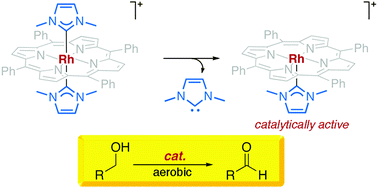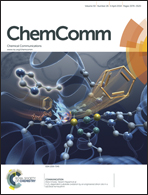Springloaded porphyrin NHC hybrid rhodium(iii) complexes: carbene dissociation and oxidation catalysis†
Abstract
Porphyrin rhodium(III) complexes accommodate one or two NHC ligands in the apical position, which leads to severe porphyrin distortion and dearomatization. The strain in the bis(carbene) complex induces facile carbene dissociation and the formation of a catalytically active site for alcohol oxidation.


 Please wait while we load your content...
Please wait while we load your content...